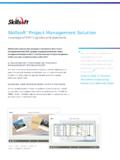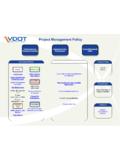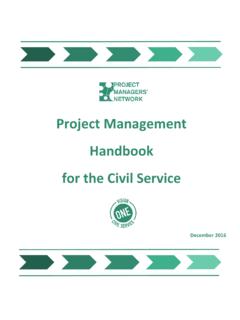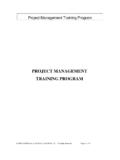Transcription of PMO Framework and PMO Models For Project …
1 2015 Darrel G. Hubbard and Dennis L. Bolles Page 1 of 22 PMO Framework and PMO Models For Project Business Management Dennis L. Bolles, PMP, President, DLB Associates, LLC and Darrel G. Hubbard, PE, President, Enterprises, LLC ABSTRACT The Project Management Institute (PMI ) in the introduction to its Pulse of the Profession: PMO Frameworks (PMI 2013d) stated: .. discoveries from this exploratory work [2012] was that many [executives and practitioners] are challenged with some of the most basic notions about a PMO: What do the letters stand for? What kinds of PMOs exist? What are the functions of the various types? Who do PMOs support? Surprisingly, the very same questions existed at all levels of management, from executive level leaders in charge of entire global organizational Project and Project -program management operations to line managers in charge of operating the single function, departmental or divisional PMO.
2 In our work, we also include the following business management related questions asked by senior business executives: What makes a PMO sustainable? How does a PMO deliver business benefit and value? What is, and is not, a PMO? Why does the position of the PMO within the enterprise matter? How do PMOs relate to the operational side of the business? What are the major steps in establishing a PMO? Is there a standard or guideline for a PMO or its structure? Does the title of the PMO matter? What is a business-oriented Framework for PMOs? What PMO Models would create a business-oriented organizational function? Beginning in 1997, we began researching and publishing answers to groups of those questions. This paper provides an overview of a Project business management PMO Framework and PMO Models useable within most enterprises.
3 And a related analysis that provides answers to those questions from a business management perspective (Bolles & Hubbard 2007a & b, 2008, 2009, 2012, & 2014) (Hubbard & Bolles 2012 & 2013). The PMO Framework and associated Models presented are based upon our ongoing research of, case studies for, and Models of Project / Project -program/ Project -portfoli o organizations (PMOs) and the application of enterprise-wide Project business management to generate enterprise business value and benefits. INTRODUCTION Project Management has arrived at all major organizational levels including the senior executive-level within businesses around the world. Project Management is now a well-recognized discipline within the field of business management, just like accounting, and as such is acknowledged by academia in their conferring of advanced degrees in Project Management.
4 Within business management circles, there is a recognition that Project management is a business function, which has matured to the point where it now enables enterprises to become world-class leaders in their markets. Our research indicates a growing pressure is being placed by the marketplace on large enterprises to more formally apply the business management of projects to their Project -programs and Project -portfolios. 2015 Darrel G. Hubbard and Dennis L. Bolles Page 2 of 22 In a world where every company is striving for the most effective competitive business weapon, the Project / Project -program/ Project -portfoli o functional organization has gained recognition. The implementing and streamlining by PMOs, within a business context on an enterprise-wide or division-wide basis, of the practices and processes of the Project management discipline has become renowned for keeping enterprise strategic initiatives on track in a wide array of industries (BCG 2013).
5 The business and Project management literature shows that properly implemented Project management principles, processes, and practices can have a significant impact on your enterprise s: x Time to market, x Cost to market, x Product and service quality to market, and x Customers recognition of your enterprise as a world-class leader. These are some of the driving forces influencing enterprises to establish and position Project business management as an enterprise-level Project management organization. PMOs applying the principles and practices of the Project management discipline, on an enterprise-wide basis, have been proven to completely transform enterprises by improving both their bottom lines and increasing the stakeholder benefits and value derived from the enterprise s projects.
6 Therefore, a number of executives and business unit heads now recognize that managing projects, Project -programs, and Project -portfolios does have a significant impact on their enterprise s bottom line. They can see that their ability to successfully manage projects depends on the proper application of specific Project management processes, knowledge, skills, tools, and techniques. Hence, it makes sense to establish such an important business function as the Project management organization, to perform the Project work, at the executive management level of the enterprise. How else can executive management ensure: x That limited funds and resources are effectively applied across the enterprise to only those projects that support the business s strategic initiatives and business objectives, and x That those selected projects are given the best opportunity to succeed from the very start?
7 The research does show that enterprises have identified opportunities to improve the alignment of Project execution with corporate strategies and business objectives that support the enterprise s mission and vision, through the use of executive-level PMOs. Enterprise-wide adoption of Project management processes and best practices also calls for single ownership of that Project management organization positioned as a direct-report to the senior executive-level as an independent business function. The research also shows PMOs can provide consistent effective management of Project -portfolios, Project -programs, and projects, and ensure a mature enterprise-specific Project management methodology is employed enterprise-wide.
8 Those PMOs can deliver the business benefits and value desired by both executive management and the organization s wider range of stakeholders. Although PMOs are seen as taking on a variety of forms and functions, the PMOs that have the greatest impact on their companies, also have an influential structural position within the organization, and present themselves as an executive-level management business function. 2015 Darrel G. Hubbard and Dennis L. Bolles Page 3 of 22 Framework AND Models PBM ORGANIZATION Through our research we have developed (Bolles 2002) (Bolles & Hubbard 2007a & b, & 2014) and refined (Bolles & Hubbard 2012) our basic integrated Project Business Management (PBM) Framework with a set of Models for our PBM Organization.
9 These align with an executive s business point-of-view for implementing Project management to gain value and benefit for the enterprise. Many publications and professional papers in the field of Project management use the terms Framework and model when referring to and describing Project management organizations. However, we have not found a detailed definition of either of those terms in the Project management literature. Therefore, we developed the following two definitions, which have guided the development of our PMO Framework and PMO Models . PMO Framework Definition In general, a type of business-oriented organizational framing and structuring composed of a conceptual description with supporting graphical representation, which holistically integrates a complex set of organizational structures, business management processes, and Project management processes.
10 Specifically, it provides an organizational Project management based framing, identification, and categorization of specific Project management and business management operational systems, policies, methodologies, practices, standards, and guidelines, which graphically depicts and explicitly describes business organizational behavior and functioning in a Project management context and gives organizational Project management both a business and operational meaning. PMO Model Definition In general, a type of business-oriented organizational structure, which supports an enterprise s business strategy and business development, and describes the rational for how a Project -portfolio management organization, Project -program management organization, and/or Project management organization collectively PMOs initiate, create, capture, and delivery value within an enterprise s economic, social, cultural, business, capabilities, infrastructure, and other contexts.








